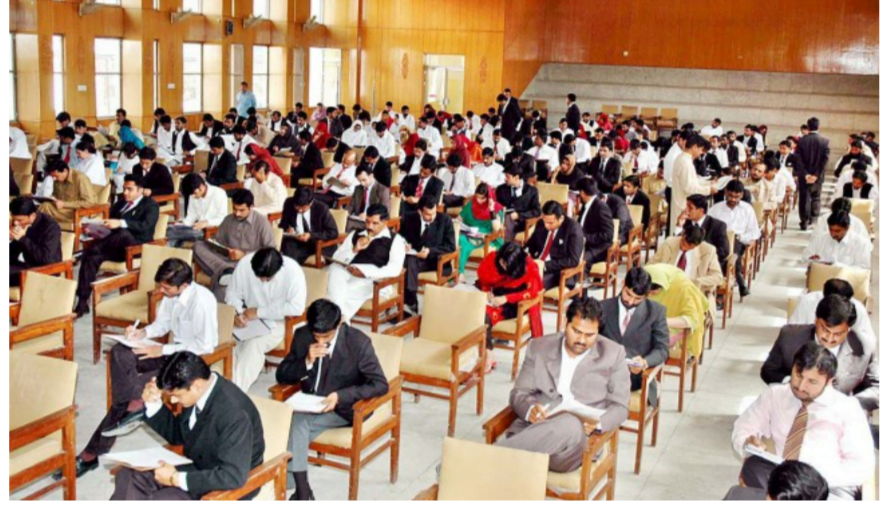The examination of Central Superior Services CSS is not a competitive examination for the federal services. It is partially competitive and substantively a quota-constructed examination. However, the specific quota of the provinces and others is recruited by domain competition except for the absorption of military human resources. Hence, by all standards, the mythical competitive examination is uncompetitive in intent and structure. The term “central superior services” itself speaks volumes about the colonial hangover of the examination. It emerged in the aftermath of administrative reforms wherein common groups were introduced in place of the erstwhile Civil Service of Pakistan CSP. The so-called term is discriminatory and unconstitutional wrapped in colonial obsession. The word “central” was specifically reserved for the colonial Indian government and “superior” is derogatory to all other jobs. Also, the word “Services” is merely an eyewash.
The existing CSS examination is the product of administrative reforms done by Mr. Zulfiqar Ali Bhutto in 1973. These reforms specifically inserted Articles 240 and 242 in the constitution of Pakistan. Article 240 (a) provides that an organic act of the Parliament shall regulate the services and posts of the Federation and All-Pakistan Services. Article 242 provides that the Federal Public Service Commission FPSC will be established for the affairs of the federation in terms of recruitment and conducting of examinations. Hence, the Federal Public Service Commission FPSC is the constitutional body to recruit the various groups of so-called central superior services. Competently, FPSC shall recruit for posts connected with the affairs of the federation. Oppositely, Provincial Public Service Commission ordinances shall constitutionally recruit for the posts connected with the affairs of a province. Then, the compilation of various groups by the Establishment Division and subsequent recruitment by the FPSC must substantiate the domains of FPSC and PPSC. But this constitutional position is being violated by recruiting Pakistan Administrative Service PAS, Pakistan Police Service PSP, and Pakistan Accounts Service to the extent of provincial posts. Even, the recruitment of Pakistan Railways under the banner of Federal groups is invalid as Railways is a CCI subject according to FLL part II read with articles 153 and 154 of the constitution. Hence, CSS should be reorganised according to the federal structures of the constitution of Pakistan.
Surprisingly, an orchestrated obsession for CSS prevails in society owing to multifarious social, economic, and political compulsions. It cunningly charms a significant part of the youth despite carrying professional skills. Owing to ever-increasing CSS candidature, lately, the process of screening out the candidates has been introduced. Irrespective of the merit of the screening argument, the screening test excludes a sufficient number of candidates for smooth holding of the CSS regular examination. Inappropriately, the written part of the examination is directly opposite to the requirements of different specialised services being recruited. How can a general examination provide equitably talented human resources to different specialised services? Under what logic can a generalist examination provide a valorous police officer, a smart tax collector, or a competent accountant all through the same test? The major fault line of the CSS examination is that it focuses more on writing skills than premier human resource skills of specialized services. As writing skills are commonly associated with rote learning unlike communicative or other skills, the required skilled human resource remains untrained. Consequently, the other parts of the examination such as the psychological test and interview become irrelevant to the magnitude of the written part of the examination. Hence, processes of psychosocial examination are hardly translated into recruitment. Hence, a candidate out-scoring the other candidates in the written part of the examination carries the day. It makes the impact of the psychological and interview part of the examination process irrelevant. Is it justifiable to recruit human resources by merely on writing skills rather than administrative or competent skills?
Besides all contradictions, the allocation of candidates in various groups is not dependent on behaviour, aptitude, or inclination but the structural delimitation of the process. Often, successful candidates are allotted those groups opposed to their aptitude and structural taste. How can a candidate holding a degree in English Literature be allocated to Pakistan Audit and Accounts Service PAAS? Finally, CSS should provide poetic justice to administrative inclinations and capacity. Despite the limitations of generalist cadres, the CSS should at least provide the best human resource after meeting all constitutional, structural, and syllabus reforms to recruit the right persons for the right groups. Last but not the least, CSS or other competitive examinations are not larger than life. Life is bigger than our imagination. There are so many other professions far better than civil services. So, if you don’t get a seat, it is not the end of the world.
















